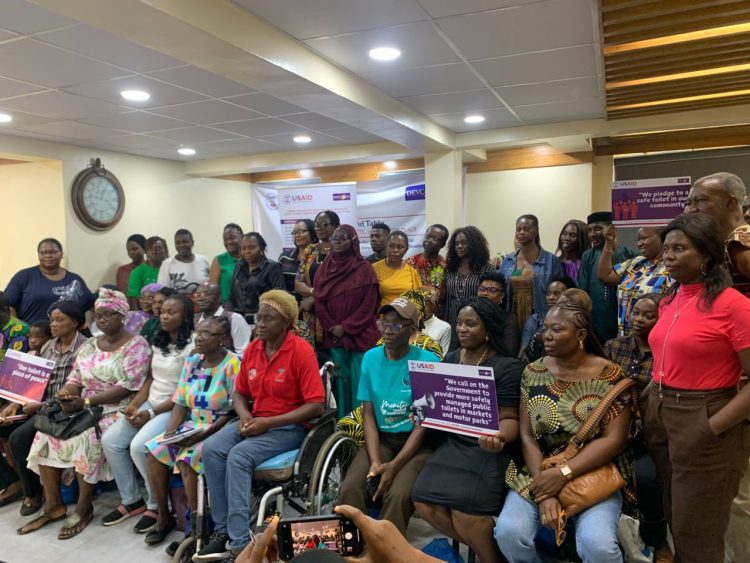Lagos residents have called for an increase in the number of public toilets across the state and making them accessible to persons with disabilities as a strategy to ending open defecation in the state.
The call was made g at a media roundtable organized by DEVCOMS to commemorate the 2024 World Toilet Day with the theme “Toilets – A Place for Peace” under its USAID LUWASH Project.
Speaking during the media roundtable, one of the participants, a wheelchair basketballer, Chloe Babatunde (not her real name), said if open defecation must be addressed, there needs to be a visible increase in the number of public toilet facilities in the state.
Babatunde shared that she lives in Ajegunle but often squats with friends in neighbourhoods around Stadium because of the difficulties of travelling long distances to her home and navigating with her wheelchair, making her heavily dependent on public toilets.
“There are no public toilets around Stadium. Some of my colleagues who are basketballers go to banks or offices nearby to use their toilets but I can’t go there because there are no wheelchair access in those facilities,” she explained.
Reluctantly admitting that she engages in open defecation, Babatunde noted that if there were more public toilets with accessible features, there would be a reduction in open defecation in the state.
For her part, Queen Enwefah, from the Community Aid Foundation in Ajeromi-Ifelodun, said the government is trying with its strategy to end open defecation, but the facilities must be clean at all times with reduced fees.
“The government is trying, but they need to do more and ensure people have access to the public toilets. If the public toilets are not clean and well-maintained, people will not use them.
“Also, the price needs to go lower, because those who genuinely need to use public toilets might not be able to afford to pay 50 Naira each time they need to urinate and/or a higher rate when they need to defecate,” Enwefah added.
Meanwhile, Ms. Akoro-Bamigbade Sesi Ebunola, Deputy Director, Office of Environmental Services, Lagos State Ministry of the Environment and Water Resources, in her presentation explained that multi-stakeholder collaboration is essential to tackling open defecation in the state.
Linking open defecation to the spread of diseases and contamination of water sources and soil, Akoro-Bamigbade noted that joint community efforts would help complement the state government’s effort to implement the Lagos State Open Defecation Free Roadmap and achieve the Federal Government’s target of Open Defecation Free Nigeria by 2025.
While sharing the Lagos State Government’s effort to stop open defecation, Akoro-Bamigbade noted that through its Resilience Strategy, the government aims to provide “57 toilets per year across all the Local Government and Local Council Development Areas in the state.”
She also noted that “the state roadmap for open defecation in Lagos state has mandated the reactivation of toilets in service stations such as fuel stations and malls for the public’s use.”
She added that the state government is bridging infrastructure gaps by rehabilitating and upgrading public toilet facilities while also exploring opportunities in Public Private Partnership.
The Deputy Director thereafter appealed to the participants to flag and report cases of open defecation and also utilize their respective platforms and networks to campaign against open defecation.
Earlier in his opening remarks, Mr Akin Jimoh, the Programs Director, DEVCOMS shared that the media roundtable was organized to disseminate the impact of the Lagos State government’s efforts to curb open defecation so that concerted efforts can be taken to achieve the common goal of ending open defecation by 2025.
Mr Akin Jimoh said the commemoration of the 2024 World Toilet Day by DEVCOMS was essential because of the multifaceted effects that it could have on the populace.
The media roundtable was well attended by journalists across different media platforms, community representatives, and CSOs working in WASH.


